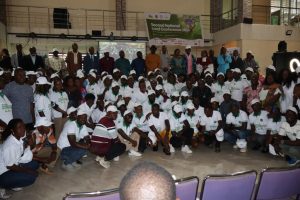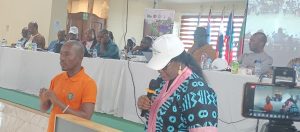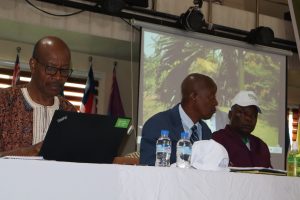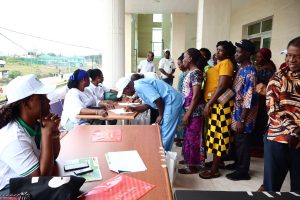
Cross-section of participants pose for group photo[Snoti Sorbor/MAP Liberia]
In the lush forests and vibrant communities of Liberia, a diverse group of land stakeholders gathered in Ganta to review the nation’s progress since the first National Land Conference was held two years ago in Buchanan city, Grand Bassa County.
The event under the theme “Looking Backwards, Looking Forward: Two Years After Liberia’s First National Land Conference,” is showcasing issues that advance land reforms, addressed ongoing challenges, and set the stage for future efforts that promote land ownership and prevent crisis.
The inaugural National Land Conference two years ago was a significant milestone in Liberia’s efforts to revamp its land governance framework.
Stakeholders, including government officials, civil society organizations, community leaders, people living with Disabilities, and international partners, jointly collaborated to adopt the ambitious Gbarzohn Declaration, which at the time focused on promoting secure land tenure, responsible agriculture investment, Women’s land rights, and peace and security.
On September 24, 2024, as part of efforts to assess the outcome of the Gbarzohn Declaration, the Liberia Land Authority, MAP Liberia, and other Local and International Organizations initiated a four-day National Land conference reflecting challenges and progress made since the first conference.
Atty. Adams Monibah, Liberia Land Authority
In his opening speech at the 2nd National Land Conference in Ganta, the head of the Liberia Land Authority (LLA),Atty. Adams Monobah emphasized the need to redefine land ownership in Liberia in the context of government and investment land policy.
He informed the gathering that land could be a potential source of conflict if nothing is done to address major gaps and challlenges in the implementation of the Land right Act of Liberia.
He noted that every Liberian is directly or indirectly affected by some kind of land crisis that has the propensity to degenerate into full-scale conflict.
“We are aware that the first letter “A” in the Government’s ARREST agenda is for agriculture, and if we are to succeed, the land issue has to be taken seriously, instituting tangible reforms to address responsilbe agriculture investment.
If care is not taken land crisis will lead to another round of civil war , i am not guessing, that something i know ” he adds.
Commissioner Monibah also called on the Liberian government to collaborate with regional bodies such as ECOWAS and MRU to establish a border harmonization Center to address cross-boundary land conflict in the region.
Atty. Monobah said that in the Mano River basin, there is emerging cross-boundary land conflict around some of the borders between Liberia and Ivory and Liberia and Guinea.
These emerging conflicts can only be control if Leaders in the Region coodinate and intervene on those border lines.
Agriculture Minister Alexander Nueteh
Land and agriculture are intertwined. In his remarks through a proxy of Liberia’s Agriculture Minister, Alexander Nueteh said, “Since we can’t do agriculture without land,it’s about time that the issues around land ownership are addressed and coordinated to support the government of Liberia’s ARREST agenda.
“The issues of land and agriculture are closely linked, and we know that people across the country are dealing with land rights issues, so we want to ask everyone to be more focussed at this four-day panel discussion session to advance suggestions and plans that will create an enabling environment for agriculture”, the Minister said through a proxy Mr. David Aquoi.
CSOs’ effort in Land governance
Civil society organizations are crucial in promoting land rights for everyone, especially women and youth. CSOs also have a role in productive plans that will support the government’s national development plan. Madam Loreta A. Pope-Kai, the president of the National Civil Society Council of Liberia (NCSCL), mentioned that there has been some progress since the passage of the Land Rights Act of 2018.
Madam Pope-Kai recognized the role of many individuals who played crucial role in advocating for the passage of the Land Rights Act but are now in decision-making positions.
She, however, called on them to lobby with their colleagues at the Legislature to increase the budget of the Liberia Land Authority to enable it fully execute its mandate of land reform.

President of the National Civil Society Council of Liberia Loreta Poke Kai [ Photo: JPN Liberia]
Madam Kai attributed delay in the implementation of the Customary land formalization to inadequate support to the LLA and reminded the government of Liberia that the LLA is under legal obligation to complete the customary land formalization to guarantee the rights of rural people to land ownership and prevent further land conflict..
“Civil society organizations (CSOs) have played a significant role in safeguarding community land rights and ensuring their respect. These organizations are also working to protect women’s land rights through legislation.
The Liberia Land Authority should issue deeds to communities that are ready to receive them”.
Specialized Court for land cases
Nimba County Superintendent Meapeh Kou Gono, in her welcome remarks, called for the establishment of a robust land court in the country.
Superintendent Gono’s calls are in reaction to the growing potential that land conflict has to undermine the peace and tranquility of Liberia.
She added that the start of the Second National Land Conference of Liberia in Ganta, Nimba County, will help reduce land conflicts and promote legal land ownership.

Liberia Land Authority head, Atty. Adams Monibah, along with stakeholders [photo: Snoti Sorbor/Rights and Rice Foundation ]
She told the conference that the issue of land squarely borders on national security and called for the protection of land documents, including land deeds. Superintendent Gono lauded the organizers of the conference, especially the Liberia Land Authority and the Multi-Actor Platform, for their farsightedness in land governance across the country
Landownership, a national security issue
Jacob Debee, II, the Representative of Grand Gedeh District #3, addressing the conference, emphasized that the issue of land is a matter of national security that needs proactive attention.
He suggested that the national government begin to take action by allocating resources to support the actors involved in the land rights process.

Registration of participants at the start of the 2nd National Land Conference [photo: Snotee O. Sorbor/Right and Rice Foundation]
He also highlighted the importance of Liberia taking a strong stance to prevent attempts by foreigners to illegally take over the country’s land, citing the influx of Burkinabes in southeastern Liberia as evidence.
Additionally, he pointed out that donor funding alone cannot solve the numerous problems contributing to the country’s land crisis.
The conference is expected to result in a resolution that will improve the country’s land governance sector for years to come. Several presentations from land rights experts and stakeholders are being made as part of the conference.
